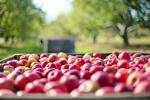
H2020 AgriMax Project: Agricultural and food waste valorization cooperatives based on flexible biorefinery processing technologies with multiple feedstocks for new high-value applications
- Type Project
- Status Filled
- Execution 2016 -2021
- Assigned Budget 12.484.461,46 €
- Scope Europeo
- Main source of financing Horizon 2020
- Project website AgriMax
The unprecedented environmental and social changes taking place globally pose numerous challenges for ensuring humanity's sustainable development in the coming decades. Around one-third of the food produced globally is wasted each year, generating 1.3 billion tons of food waste annually. Food losses occur throughout the entire food value chain, from farmers to consumers.
The European Bioeconomy Strategy includes measures to ensure food security, manage natural resources, reduce dependence on non-renewable resources, mitigate and adapt to climate change, create jobs, and maintain European competitiveness. Agrimax brings several benefits to primary production, such as reducing food loss, conserving natural resources, replacing fossil raw materials, valorizing by-products, and reducing environmental impact. These results have been demonstrated at demonstration scale through the development of two multi-feedstock pilot biorefineries. These convert agricultural and food processing waste (AFPW) into validated products in an operational environment.
The two pilot biorefineries were built in Italy and Spain, modernizing and expanding the functionalities of the facilities already available on site. These are now being used to manufacture products that, in the second half of the project, were validated for their final applications. The performance of the final products was validated, and the overall environmental impact of the entire value chain was successfully assessed according to the LCA standard. Based on previous results, numerous case studies were selected to reveal the potential of new agri-food value chains based on residues from the processing of tomatoes, cereals, olives, and potatoes.
Agrimax's results enable optimal by-product recovery in biorefineries, as well as their use in cutin-based coatings, proteins for food applications, fibers for biocomposites, flavors, phenolic compounds, lycopene and minor carotenoids, advanced cellulose fibers, fungal-produced biopolymers for secondary packaging, building blocks for aromatic biopolymers, compost, and hydrocompost. These products can now be applied in three markets: 1] Packaging (the project covers bio-based solutions for flexible and rigid packaging, active and passive barrier materials, coatings for metal containers, biocomposites, and secondary packaging). 2] Food (additives, ingredients, coatings, microorganisms used in production, and improved food products will be delivered). 3] Agriculture (bioplastic-incorporated fertilizer-based solutions for mulch films and pots, as well as waste-derived advanced biofertilizers with biostimulant and biocontrol properties, to be delivered in a cascade approach).
Agrimax has also developed new business models to maximize the impact of the project's results. This activity has been carried out in collaboration with stakeholders, who also participate through the development of a Joint Stakeholder Platform that opens the pilot biorefineries to external entities.
During the first reporting period (up to M18), the consortium focused its efforts primarily on the design of the two pilot biorefineries. The first six months of the project were used to establish the framework for the consistent and effective development of subsequent activities. First, the state-of-the-art in the conversion of agricultural food waste was reviewed and feedstock availability was defined. Market benchmarks and applicable regulations were also identified and considered for successful implementation and market introduction of the project results. From month 6 to month 18, the consortium developed the conceptual design of the pilot plants. In addition, aspects related to the storage capacity of the different feedstocks, as well as the properties of the main products from both pilot plants, were evaluated. A Joint Stakeholder Platform was established to engage a relevant number of stakeholders and open the biorefineries to potential local users.
During the second reporting period (M19-M30), the consortium focused its efforts on the construction and commissioning of the two biorefineries. Upon completion of RP2 (M30, March 2019), the Italian Pilot Plant building was completed, and the project consortium unofficially inaugurated the biorefinery, ready to begin functional testing. The Spanish Pilot Plant remained under construction in M30, with an estimated completion date of M36 (September 2019). Simultaneously, the consortium began preparing for the optimization of the biorefinery processes and the valorization of its products. Finally, the consortium continued its outreach and communication activities by developing and publishing several videos, launching the first version of the Joint Stakeholder Platform for internal testing within the consortium, and continuing work on a comprehensive exploitation strategy and developing new circular business models.
During the third reporting period, from M31 (04/01/2019) to M60 (09/30/2021), the consortium focused its efforts primarily on commissioning two pilot biorefineries and conducting functional trials to test the implemented novel technologies. In parallel, data and information from the pilot trials were used to continuously improve the valorization performance of by-products and waste streams, evaluate the use of derived biocomposites as feed additives, food ingredients, or edible coatings, conduct LCA and techno-economic assessments of the plants, define cooperative business models, and achieve the rest of the Agrimax outcomes. The aforementioned activities also enabled the partners working on the valorization of the pilot results and waste streams to receive feedback and samples on the pilot results and proceed with preliminary material characterization and processing activities, the results of which fed into their preparation for scale-up once the pilots were operating at full capacity. Importantly, with the exact pilot capacities and production dates/quantities known with a high degree of certainty, it was possible to create a detailed supply and demand plan where supply was determined by the pilot plants based on their capacities and raw material availability (i.e., seasonality).
Approximately one-third of all food produced globally is wasted each year along the entire value chain, from farmers to consumers. To extract the significant amounts of valuable compounds contained in this waste, AgriMax will combine affordable and flexible processing technologies (ultrasound- and solvent-assisted extraction, filtration, thermal and enzymatic treatments) for the valorization of side streams from the horticultural cultivation and food processing industries, which will be used in a cooperative approach by local stakeholders.
The holistic potential of four new agricultural value chains (residues and by-products from the cultivation and processing of tomatoes, cereals, olives, and potatoes). Any by-products generated throughout the production cycle will be valorized in a cascade, reaching more than 40% of the high-value use of the residues. This will lead to additional production of active ingredients in lower concentrations, but also of fibers, biogas, and fertilizers from the remaining biomass (the latter with the goal of being used in a closed loop in the cultivation of the crops used in the project to avoid soil depletion).
An LCA and a LCC will also study the best approach to minimizing the environmental impact of new value chains without jeopardizing operational profitability. Pilot biorefinery processes with multiple feedstocks will be validated at two demonstration sites in Spain and Italy. Social, ethical, safety, technological feasibility, and regulatory aspects will be studied.
Last but not least, a business model and communication platform will be created between potential raw material suppliers to maximize the use of the cooperative treatment plants year-round.
To drive the transition to a bio-based economy in Europe, AgriMax is developing an innovative generation of flexible, multipurpose biorefineries that utilize a variety of innovative conversion technologies in a cascade to produce high-value bioproducts.
Ultrasound-assisted extraction, steam explosion, enzymatic treatment, and filtration technologies complement each other to obtain biocomposites in several ways: a) by improving extraction efficiency and, consequently, cost-effectiveness; b) by providing the opportunity to use environmentally friendly solvents (e.g., water) by improving their extraction efficiency; c) by improving the extraction of heat-sensitive components under conditions that would otherwise result in low or unacceptable yields.
AgriMax will also accelerate market adoption of biorefinery products by developing a tailored business model and engaging relevant stakeholders through an online platform to access the facilities and test the resulting products.
- IRIS TECHNOLOGY SOLUTIONS, SOCIEDAD LIMITADA (IRIS)







